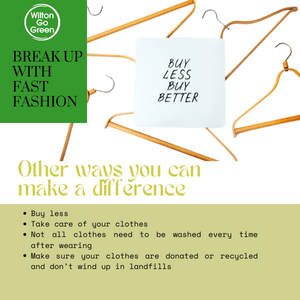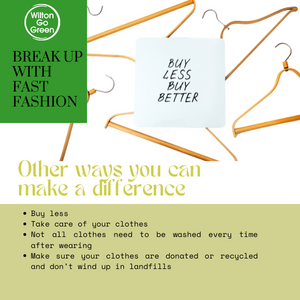
Written by WGG Spring 2022 High School Intern Elizabeth Vermeulene
Fast fashion culture is on the rise now more than ever. With social media influencers flaunting the latest fashion trends from Shein or Fashion Nova, more consumers are driven to purchase the clothing from these brands, which is cheap, on-trend, and available at the click of a button. Generally defined, fast fashion is inexpensive clothing produced rapidly to meet the latest trends. With pressure to reduce the cost and production time, environmental concerns are often pushed aside. Its use of cheap, toxic textile dyes makes the fashion industry one of the largest polluters of clean water globally. Cheap textiles also pose an issue, such as polyester- which comes from fossil fuels, contributes to global warming, and increases the number of plastic microfibers in our oceans- yet it is still one of the most widely used materials. Even natural fabrics such as cotton require large amounts of water and pesticides to be grown. It takes around 2700 liters of water to make one t-shirt which is enough for one person to drink for 2.5 years. This increasing demand for cheap clothing leads to increasing stress on our environment.Â

However, there is an ever-growing movement that is turning fast fashion on its head, and it’s known as the sustainable fashion movement. Sustainable fashion is an all-inclusive term describing products and processes aiming to achieve a carbon-neutral fashion industry, built on equality, social justice, animal welfare, and ecological integrity. In contrast to fast fashion, slow fashion focuses on designing, sourcing, and producing clothes with the intention of reducing environmental impact and being used for long-term wear. It uses organic fabrics, fewer chemicals, and recycled fibers. This alternative approach reduces the pollution and emissions from clothing production.
To combat this issue we must be conscious consumers, which means shopping with sustainability in mind. This includes buying from brands that are ethical and sustainable, and don’t include greenwashing in their advertising. Greenwashing often includes buzzwords such as all-natural, eco-friendly, and non-toxic to deceptively persuade the consumer that the brand and products are environmentally friendly. Some fast fashion brands to avoid are Shein, H&M, Forever 21, Zara, Urban Outfitters, and Romwe. These companies perpetuate the throw-away culture of fast fashion and often don’t pay their workers fairly. Fast fashion brands are recognizable by their release of new clothing every week, lack of transparency in how their products are made, and low prices that seem too good to be true. However, some brands you should definitely shop from are Patagonia, Pact, Quince, Reformation, and ABLE. All these brands use recycled or organic materials, make efforts to offset carbon emissions and pay their workers a living wage. Another alternative is shopping secondhand, which not only reduces the stress on the environment by decreasing the demand for new retail goods, but it also saves the consumer money. You can shop secondhand from both local thrift stores like The Turnover Shop in Wilton and the Ridgefield Thrift Shop, as well as from a variety of online companies like ThredUp, Depop, and Curtsy, which allow users to buy and sell clothes.
While companies advertising 40% off or a buy one get one free sale is often tempting, one of the easiest ways to reduce your environmental impact is to buy less. Taking care of clothes and trying to fix them or upcycle them when needed can also help to reduce the number of new clothes we need to buy. It’s also important to know which clothes don’t need to be washed after every wear, such as jeans because over the course of a year this will save a lot of water. When it’s time to finally get rid of clothes, it’s so important to ensure that they have a second home, and are either donated or recycled, so that our clothes don’t wind up in landfills. Any small changes people can make in their purchasing decisions can help to make a difference. We don’t need a handful of people doing zero waste perfectly, we need millions of people doing it imperfectly.
Keep an eye out on our social media this month as we highlight pieces of this blog and focus on Back to School Reusing instead of shopping!
